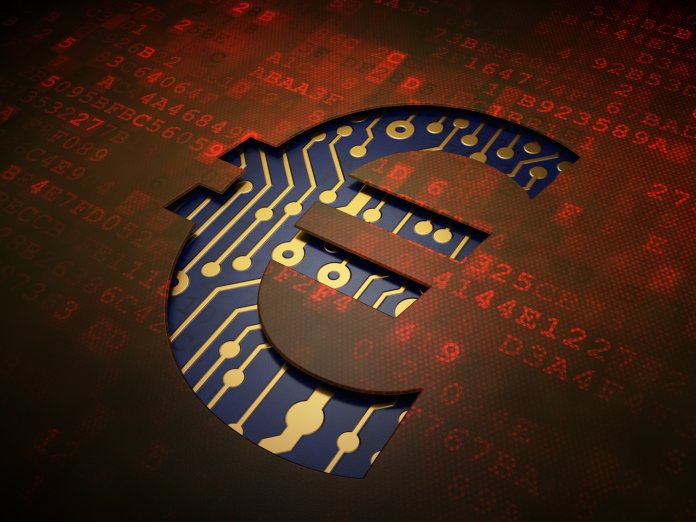German banks say: The economy needs a digital currency based on the euro
German Banks has Proposed the creation of Digital Euro and Smart Contracts. Facebook’s announcement of its plans to launch digital money called Libra within twelve months has attracted considerable attention. Also brought strong opposition worldwide. Policymakers have recognized that this initiative questions how the global monetary system will be like in the digital age. Also who will dictate it in the future. So, an Association of 200 German Private Banks has Proposed the creation of Digital Euro and Smart Contracts.
There is no doubt that the responsibility for the monetary system falls on the sovereign nation-states. Therefore, any currency provided by German banks or other private companies must fit into the system determined by the state. Anything else would ultimately lead to chaos and instability.
The technological innovation of the Fourth Industrial Revolution will be the engine of structural change in the global economy. This innovation has the potential to radically alter our payment and value storage methods. This makes achieving a social consensus on how programmable digital money can be integrated into the existing financial system even more important.
Section 2.1
The main burden of this public policy task lies with the central banks, governments, parliaments, and regulators. But one thing is certain: banks are also challenged, as innovation and digital change will permanently transform their industry.
In this context, the current discussion on Libra is simply one aspect of an important problem that goes beyond Facebook’s planned currency. In their position paper, the Association of German Banks explores the contribution that banks can make towards a sustainable and innovative monetary system, how the general environment should be designed so that banks can operate alongside new competitors, and what is needed to guarantee the stability of the banks in the financial system.
Stances of the Association of German Banks and Digital Euro
Part 1
- A stable currency is the basis of any economic system; having one is a key element of state sovereignty. Therefore, the existing monetary system stability should not be jeopardized by the provision of digital money based on cryptography.
- German private banks consider digital currencies to be an innovation with great potential. Also, it can be an essential component in the next stage of the evolution of digitalization.
- German banks will contribute to the establishment of a sustainable and innovative monetary system with smart contracts. For this purpose, a digital wallet and a digital currency based on the digital euro must be created. Also, its interoperability with fiat money ensured. One prerequisite for this is to establish a common pan-European payment platform for the programmable digital euro.
- To create public confidence in digital money, it is essential to meet the highest regulatory standards. To guarantee legal certainty, the legal classification of programmable digital money is also necessary. All innovators must comply with a uniform supervision and regulation framework. The issuance and storage of cryptocurrencies should also be possible under existing banking rules.
- Private banks in Germany expect legislators and regulators to lay the essential foundations for digital innovation. Mainly in the banking sector.
Part 2
- European lawmakers shall create a competitive legal framework to facilitate pan-European payment solutions. To allow banks to compete in equal terms, competition policies must take into account changes in the international competitive environment. Also create a new framework that establishes legal certainty for cooperation among European market participants. German banks support a uniform European approach to define this competitive framework.
- The users of digital euros, be them persons or systems, must be clearly identifiable. This requires a European or, even better, a Global standard of identification. With each form of digital currency, customers must identify themselves. Using a standard strict as the one which banks and other compelled entities must apply in the current legal framework. Also, it should pursue the fight against money laundering and terrorism financing.
- The processing of personal data in relation to cryptocurrencies requires a viable data protection strategy.
- It is necessary to clarify the legal basis on which programmable digital money will be used. They should follow the existing consumer protection regulations.
- It should clarify whether programmable digital money is a currency or an asset for the purposes of income tax calculations. The design of cryptocurrencies requires specifications to facilitate related VAT calculations. With regard to the management of wallets, especially in developing countries, the application of taxes must be guaranteed.
- Derived from deposit guarantee systems, bank customers’ deposits enjoy a high level of security. This level of protection should also be the benchmark for cryptocurrencies. In any case, service providers must inform customers clearly and verifiably if there is no deposit protection.
In-depth analysis and digital money and Digital Euro
What is the definition of digital money? What about German Banks?
We use digital money every single day. We have long been familiar with it in the form of money transfers, direct debits, checks or card payments. In Libra, Bitcoin, Alipay, M-Pesa and other cryptocurrencies, maybe Digital Euro in the future, we can find new challenges that we still don’t fully understand how to handle. The truth is that the emergence of cryptocurrencies has increased the diversity of digital forms of money.
We can also be sure that, unlike traditional digital money, the new cryptocurrencies present a significant technological innovation. These currencies are related to the “smart contracts”. They are programmable algorithms that map or verify the terms of a contract between parties. For example, they can automatically initiate a payment when a transaction is held.
This is the reason why “programmable digital money” is an often mentioned term. Private German banks are convinced that this form of digital money will quickly increase its relevance. Smart contracts can be linked not only to cryptocurrencies but also to account-based fiat money. Therefore, it is important to distinguish between programmable, like Digital Euro, and non-programmable digital money. Libra is will be a programmable digital currency based on cryptography.
Next, we will analyze each one of the statements expressed by the German Association of Banks.
Stance 1
A stable currency is the basis of any economic system; having one is a key element of state sovereignty. Therefore, the stability of the existing monetary system should not be jeopardized by the provision of digital money based on cryptography.
Digital currencies that are based on cryptography are an innovation that has very important implications. They also have the potential to take the circulating money of an economy away from the existing banking system. This raises a large number of issues to be solved for the future design of the monetary system. Policymakers should stop being only spectators. Most importantly, central banks could play an essential role in shaping this future.
Section 1.1
The public debate is currently being driven by the plans announced by a consortium led by Facebook to launch a global private digital currency called Libra. If a global currency arises, this would be the first time this happens. For a good reason a single global currency has not emerged to date.
Not only would it have to simultaneously meet very different legal and regulatory requirement. It would also have to react appropriately to different economic developments. The Euro has shown that a single currency can be a source of considerable economic and political conflicts.
A private global digital currency competing with the official currencies in the world economy would not solve the existing problems. Instead, it would be very likely to increase the present economic conflicts. Mass capital flows into and out of an economy could, for example, seriously alter the economic balance of a country. The corrective tools would lose effectiveness if the new form of money were to reach a high level of acceptance. Measures aimed more directly at addressing symptoms would also lose their effectiveness. A global digital currency is then probably not favorable for a stable global economic panorama.
Section 1.2
There is no other way to interpret the negative comments on Libra coming from the politicians. The statement by the “G7 Working Group on Stablecoins” issued that policymakers have identified a trade-off. Here, they are prepared to shape between possible efficiency gains, particularly in cross-border money transfers, and the risks created.
In this context, private banks call on national and international policymakers to act in a responsible manner. Competition with private currencies endangers the monetary sovereignty of the states and, therefore, should not be permitted. The expectation that through the regulation of this new type of money, new systemic risks can be completely avoided. Their characteristics of increased productivity and efficiency can be exploited for the benefit of the international financial system.
Section 1.3
To control the systemic risks of this type of global currency, internationally coordinated and mutually compatible regulatory measures would be necessary. The experience gained from the financial crisis has shown that this takes a long time and that the international consensus can become very fragile quickly. The G7 requirement that a stablecoin must meet the highest regulatory standards obliges international policymakers to guarantee that the necessary political processes are implemented.
This includes, above all, guaranteeing the long-term functioning of the existing global monetary system. Its main feature is the privileged access of banks to central bank money. In order to allow better control of the potential risks of stablecoins, it has been proposed that access to central bank money be granted to private forms of cryptocurrencies. However, this would mean breaking the principle of privileged access to banks at the same time. The general direct availability of money from the digital central bank outside the banking sector would seriously distort competition between banks and private currency providers. This could jeopardize the stability of the international financial system as a whole.
Section 1.4
There are other systemic challenges that must be taken into account. In the case of achieving a high level of acceptance among users of social networks, the securities portfolio needed to support a stablecoin for global use (short-term government securities denominated in stablecoins) could quickly reach a size that would be systemically important, since it also aggravates the shortage of these so-called “safe assets”. This could become a problem for a monetary policy aimed at quantitative easing. In addition, lower interest rates due to higher demand would affect the monetary policy of, for example, the ECB. There may be a change in the importance of the different transmission mechanisms through which monetary policy directs the economy.
The risks resulting from the principles of building a stablecoin would also be a problem. Particularly when the backing is provided by a currency basket. The regrouping of the portfolio can lead to greater volatility in the capital markets. One of the challenges is likely to be the moment when “reserve currencies”. Also when stablecoins experience a loss of confidence. As a result, there may be massive capital movements in one direction or another. Any change in the composition of the currency basket can also trigger sudden changes in the exchange rates.
Section 1.5
All the risks to which users are directly exposed must also be taken into account. As the example of Libra shows, they could jeopardize the guarantee of reimbursement at face value.
- Exchange rate risk. It is present when claims represented by a stablecoin are based on a currency other than the local fiat currency. Libra, for example, is in this case since it is linked to a currency basket. This type of claim differs fundamentally from bank deposits in local currency; In contrast to these, they have a speculative nature. The introduction of a digital euro and smart contracts by commercial banks wouldn’t mean any increase in risk.
- Risk of a run of a stablecoin might face a run for several reasons. If money is issued that exceeds the funds held in the escrow account, that is, if credit is created. But a run can also happen if the underlying assets are not liquid enough.
- Liquidity risk happens when there is a delay in the fulfillment of reimbursement requests. Liquidity risk depends on the market liquidity of the assets held by the issuer, for example, the Libra Reserve. It may increase due to the fact that nobody has the legal obligation to accept Libra.
- Repayment risk means there is an essential difference between a traditional bank deposit and a stablecoin deposit. A deposit of 100 euros includes a legally binding obligation to repay it in physical money with same value. In the case of stablecoins, there is only a non-binding promise to stabilize the book value of the reserves. A higher repayment risk is therefore present compared to traditional bank deposits.
Stance 2
German private banks consider digital currencies to be an innovation with great potential that can be an essential component in the next stage of the evolution of digital money.
We already experience every day the intensity with which digitalization is changing the way we live, work and spend our money. Online shopping is very frequent among today’s consumers. Digital platforms are connecting companies with consumers and also companies with each other, both at a national and at an international level. New business models are disrupting virtually all sectors and breaking value chains which had been successful so far, with widespread implications for national economic structures.
Section 2.1
This disruptive process does not limit itself to the ways we pay and store value. In its white paper on Libra, Facebook demonstrated an unmistakable intent to that effect. The digitalization of both the economy and our daily lives imposes new requirements for the digital forms of money. Programmable digital money and smart contracts, whether based on accounts or on a distributed ledger technology (DLT), will be an essential element of the digital transformation and will play an important role, particularly in relation to smart contracts.
DLT-based smart contracts allow the correct and automated execution of contractual agreements. Compliance with these agreements often involves transactions of payment. Programmable money is needed for them to be done completely automatically, regardless of their amount. The use of smart contracts related to digital money could, for example, guarantee the automatic remuneration of digital goods’ rights holders. Also, with the Internet of Things (IoT), more and more devices are connected to the Web, so that data can be generated, exchanged and processed both between machines (M2M) and between machines and people (M2P). Full automation of this interaction can also be achieved with the help of smart contracts.
Section 2.2
An important point to make in this aspect is that the clients’ data is encrypted. Consequently, the transfer is safe with control over access to the data, which always remains in the hands of the client. The audibility and availability of historical transaction data can drastically reduce the risk of misuse and cybercrime.
Today, China is already a leading user of IoT. In addition, there is a strong political will within the country to obtain more technological advantages or strengthen existing ones. The recent announcement by the Chinese central bank of its plans to introduce a digital version of the renminbi looks good in this context.
If we add Libra, this shows that several digital forms of money may soon be a reality and that DLT will play a key role in this regard. Europe must keep up with this competition, so that the global financial architecture does not lead to a polarization between the American and Chinese solutions.
Section 2.3
The financial sector in Germany is making great efforts to remain competitive in the digitally-driven structural transformation. However, when it comes to the connection of IoT processes and payments, it is currently experimenting with isolated solutions. However, a competitive payment system can only be based on a common standard and a common currency, the euro. German banks and europian banks can successfully support this development with the use of programmable digital money.
Given the rapid structural change driven by digital technology and the growing relevance of IoT, the importance of programmable forms of money is also likely to increase rapidly.
The introduction of programmable digital money based on the euro should be considered to maintain Europe’s competitiveness, meet customer needs and reduce transaction costs.
Stance 3
German private banks will contribute to the establishment of a sustainable and innovative monetary system. For this purpose, a digital wallet and a digital currency based on the euro must be created and its interoperability with fiat money ensured. One prerequisite for this is to establish a common pan-European payment platform for the programmable digital euro.
Programmable digital money and smart contracts has advantages over conventional payment systems; mainly the fact that it offers greater benefits for customers. Although one of its main features, the immediate execution of transactions, already exist through the establishment of the SEPA instant payment system, it is not yet possible to integrate it into digital processes or smart contracts.
Section 3.1
For this reason, a general European strategy must first start with the objective of creating an infrastructure for the implementation of digital business models and, therefore, also allowing the integration of smart contracts. Payments with programmable digital money should be one of the main components of this strategy. At a European level, the banking industry should work with central banks to create a payment system that addresses existing issues and at the same time retains the main advantages of already established payment infrastructures. In addition to legal security, these include a high level of efficiency based on common standards and pan-European accessibility.
This is the only way to hold ground against the competitive pressure of technology companies from the US and probably soon from China. It requires a European strategy that is based on regulators and market players working together to generate enough momentum.
We can only get his roadmap and objective within a reasonable time horizon through a two-step approach. Firstly, by creating a programmable euro based on accounts and, secondly, by creating a programmable cryptocurrency based on the euro.
Section 3.2
In the first step, conventional systems gets better so that they can connect more easily to digital processes and smart contracts. The aforementioned SEPA instant payment standard can be the basis for this. However, the standard or infrastructure data models are to allow adequate connectivity with smart contracts. An improvement in this regard could be a great step towards the interconnection of conventional payments and smart contracts or other digital offers and, therefore, to allow mapping and implementation of rule-based transactions. The standardization work is a requirement by private sector actors with the support of the European system.
The account-based solution is a fundamental intermediate step on the path towards the direct integration of smart contracts and payments. Based on this, programmable money based on cryptography must be created. To date, offers already exist from individual market players, including banks. This allow the smooth integration of smart contracts and the settlement of claims resulting from them within a system. However, these are specific solutions provided by single players. Therefore, the system needs cryptography interoperability across Europe to achieve real scalability in economic terms. As a result, an initiative on establishing technical and contractual standards will ensure technical connectivity and payment accounting.
As with conventional payments, the coexistence of public (Eurosystem-based) and private infrastructures is viable for this purpose. The participation of regulators and legislators is also necessary since the existing supervisory and civil frameworks for conventional payment systems must also be applicable to solutions based on tokens.
Stance 4
To create public confidence in digital money and smart contracts, it is essential to meet the highest regulatory standards. To guarantee legal certainty, legal classification of programmable digital money is also necessary. All innovators must comply with a uniform supervision and regulation framework. The issuance and storage of cryptocurrencies should also be possible under existing banking rules.
If a cryptographic digital money, such as digital euro, is going to reach global acceptance, it would be ideal that the regulations be adopted internationally. Or at least they should be based on uniform international standards. Regulatory approaches by country would lead to market segmentation and, consequently, to the appearance of exchange rates, which could probably hinder the exploitation of digital currency’s benefits.
Section 4.1
Firstly, the existing regulatory standards which would be applicable to programmable digital money should be clarified. If these standards adequately take into account the specificity of programmable digital money, they should have a proper analysis. Only with the guaranty of programmable digital money there will be subject to the appropriate regulatory standards. Therefore, it will be legal certainty about the management of digital money. Consequently, only then will the general public trust digital money, like digital euro.
The regulation of programmable digital money should also be neutral in terms of technology: the economic purpose must be the factor that determines the type of regulation adopted, not the technology used or the legal construction. The regulation should, at the same time, be proportional to the risks: a technology company that offers banking services must also be regulated as a bank.
Section 4.2
A company that meets the highest standards should not stop from carrying out activities related to cryptocurrencies. A negative example in this regard is the German government’s bill to amend the Fourth Anti-Money Laundering EU Directive. This bill currently stipulates that banks cannot conduct cryptocurrency custody services, although the directive itself does not require this. However, because companies with a full banking license already have to meet the highest standards, and have past experience in asset custody, this provision of the German banks is unreasonable and must be urgently discarded. In order to ensure conditions equality and promote Germany and Europe as a center of innovation, any company that meets the appropriate standards should conduct their cryptocurrency businesses.
Stance 5
Private banks in Germany expect legislators and regulators to lay the essential foundations for digital innovation, mainly in the banking sector.
The legal framework that governs the financial sector must not only guarantee equal opportunities and high standards of consumer protection and financial stability, but it should also create the necessary environment for innovation. This is the only way to ensure that Germany remains competitive.
Therefore, we welcome the blockchain strategy of the German government, which highlights the obstacles to innovation in its section on the financial sector, such as the need for securities to take the form of certificates, and in which the government promotes solutions that offer legal certainty.
Section 5.1
The government also brings to our attention that the subsequent development of blockchain technologies requires means of payment with a stable value in a blockchain environment. This to be able to make legal transactions with payments on delivery. A suitable technology-neutral legal framework should exist to promote these and other innovations. It is possible and very important to remove the existing barriers without reducing the level of protection for consumers.
We do not see the need for additional and dedicated blockchain or DLT regulation over existing regulations that govern securities, capital markets, and banks. To avoid regulatory voids, it is necessary to extend existing requirements for DLT solutions.
The German government also mentions real laboratories that offer an environment to test innovations in this strategy. A required condition for such laboratories is to include experimentation clauses that allow the scope to test new technologies in the legislation. Regrettably, there are no such clauses for experimentation in the legislation that governs the financial sector. Also, the sandbox, which is the regulatory equivalent of the laboratory that allows close cooperation between supervisors and innovators in order to quickly create legal certainty for innovations, still has to be established in Germany.
In addition to a general regulatory acceptance to innovation, we need more specific measures in Germany in order to facilitate innovations, such as programmable digital money like a digital euro. Ideally, such approaches should exist at an European level. In this light, we welcome the work on the blockchain of the European Commission. For example, the EU created the EU Blockchain Observatory and Forum initiative in 2018, therefore sending an important message.
Stance 6
European lawmakers shall create a competitive legal framework to facilitate pan-European payment solutions. To allow banks to compete in equal terms with new players, competition policies must take into account changes in the international competitive environment and create a new framework that establishes legal certainty for cooperation among European market participants. German banks support a uniform European approach to define this competitive framework.
The rise of platform-based payment systems and programmable digital money will influence the current organization of the banking financial system. Even though the processing of payments by banks is fundamental to the proper functioning of the financial system, both banks, and their customers have so far understood this as a natural complement of, and in fact almost as a byproduct of, the deposit and loan activities from banks. Banks consider themselves a central point of contact for customers and they adopt a holistic approach to manage customers’ relations, including the provision of asset management services.
Section 6.1
In a world dominated by platforms, this can change. Payment transactions will become an important entry point for customers. Other types of financial services, like loans and asset management, can, in fact, become a complement to payment services. In this case, we would probably see important changes in the banking system. In addition to the pressure derived from greater competition, banks would face the loss of revenue from transactions and commissions. Therefore, they would have to expand their current business models to include services related to programmable digital money, Digital Euro, (storage, wallets, loans).
As a consequence, banks will compete from a disadvantageous position with programmable digital money providers from all over the world. Since the stable and low-cost retail banking business will face direct competition from programmable digital money providers, banks could lose financial transaction data in addition to customers themselves. In addition, market concentration might manage the programmable digital money providers. Just if they refinance through a few large banks, in case of the digital euro. This could bring increasing refinancing problems for smaller banks. In a worst-case scenario, banks would lose a source of direct refinancing if consumers exchange their savings into other currencies and reject traditional financial partners.
Both deposit-taking and payment services can show the characteristics of a natural monopoly. For example, they will reduce payment transaction costs if payments can be made in a single currency used by all the parties. As for the deposit-taking business, reserves management also shows positive economies of scale. If the volume of deposits is higher, they will generate more money. As a general rule, income can be generated on loan interest. In addition, payment institutions operating in a larger scale incur lower costs to monitor their borrowers.
Section 6.2
It is reasonable to believe that, if a social media company issued programmable digital money, it could reach a monopolistic position. For example, the need of a high overhead to build a parallel currency could be an insurmountable obstacle for potential competitors. Also, the strong network effects and the exponential benefits of access to data. All of these factors favor the main international players who are entering the market first.
Moreover, large technology companies could increase their market position in payment processing services using the data they have collected already in order to penetrate new markets. Large technology companies already have a significant competitive advantage due to the large amount of user data they have collected. A power imbalance of this magnitude in favor of a large company would not only increase the probability of an abuse of power, but could also pose a threat to macroeconomic stability.
In this context, we see the research carried out by the German and European competition authorities as favorable. Under the current circumstances, the requirements included in the competition legislation, at least in the case of a company obtaining control of the market, can lead to restrictions on the legality of the collection, consolidation and processing of user data.
Section 6.3
As the decision of the German Federal Bureau of Cartels taken in the Spring of 2019 on Facebook shows, even the existing competition laws can set effective limits to some extent. It is possible to use the European laws on data protection as a reference point to handle possible abuse of a dominant market position. However, it is necessary an update for German and European competition law. Especially the laws pertaining to the definition of “market” and to the control of abusive practices.
New competition laws should support the development of a programmable digital euro. Competition law should foster and not thwart the cooperation between banks and European companies in order to achieve this. It would be impossible for a single company to create an acceptable programmable digital currency. The market in practice due to the global strength and position of large technology companies would never approve this.
Due to the uncertainty that exists on the limits established by antitrust law on collaborative projects in the digital economy, it is especially important to increase legal certainty on this topic. The Commission of Experts on Competition Law 4.0 has recognized this aspect and discussed it in its recommendations.
Stance 7
The users of digital euros, be them persons or systems, must be clearly identifiable. This requires a European or, even better, a Global standard of identification. With each form of digital currency, customers must identify themselves using a standard that is as strict as the one which banks and other compelled entities must apply in the current legal framework and it should pursue the fight against money laundering and terrorism financing.
The exchange of cryptocurrencies, as well as other digital assets, requires an identification system for the parties in each transaction. If this fails to happen, transactions would lack the necessary traceability and evidence not only for the parties directly involved but also for affected third parties, such as the tax authorities.
Section 7.1
In the current monetary system based on accounts, it is the bank managing the account that is responsible for the identification of the account holder, the person or people authorized to access the account and the owner(s) or beneficiary/beneficiaries. On the other hand, it is possible that digital money will become an integral part of digital value-added processes in the future and that cryptocurrency-based payments will be executed directly between the parties to the corresponding transaction in a legally effective manner without the need for a separate payment infrastructure based on accounts (see Stance 3).
This kind of payment transactions will need a reliable pan-European digital identity standard, at least, that should allow cryptocurrency tokens to correspond accurately and reliably to natural and legal persons. This identity standard should also allow devices to clearly match to their legal owners. This way, in the IoT, assets will transfer directly between devices, and filed in a way that provides legal certainty.
This homogeneous identity standard must also meet the data protection requirements in the EU by using, for example, pseudonymization techniques or an autonomous digital identity solution.
Section 7.2
At the same time, the current Anti-money Laundering and Counter-Terrorism Financing measures by payment service providers should not be less. This as a result of payment transactions executed using cryptocurrencies without univocal identification of the parties. To avert this, new customer identification solutions must guarantee the same quality as banks providing payment transactions guarantee now. This is true not only for identification per se but also for the subsequent monitoring of transactions in order to prevent money laundering and terrorism financing.
Stance 8
The processing of personal data in relation to cryptocurrencies requires a viable data protection strategy and digital Euro.
Laws on data protection are always relevant when it comes to personal data. Therefore, it is important to start by clarifying whether the data from theses parties will, in fact, exist as a digital money system, such as digital euro. This might not be the case with regard to cryptocurrencies: a procedure that does not require any personal data could be devised. However, the European General Data Protection Regulation (GDPR) must comply with the EU if they get thirds personal data. Even pseudonymized data presents this requirement. Also, if a company’s office is not in the EU, the GDPR remains applicable when processing data of EU citizens. However, it is still not clear how European data protection laws can be adequately enforced in these cases.
Section 8.1
The main points to have in mind when designing an adequate data protection strategy include:
- Need to specify which organizations determine the objectives and means of personal data processing (controller)
- Legality of data processing (consent vs. contract)
- Safeguarding of data protection rights of the interested parties (for example, transparency, right to eliminate data)
- Observance of the purpose limitation principle
- Use of technology for data protection (“privacy by design”)
- Guarantee of an adequate data protection level of third party countries
- Clarification of government institutions’ rights to access this data (for example, to combat crime or tax fraud)
If there is no solution with the GDPR for these points, it might be worth considering the idea of developing a specific EU regulation for data protection problems related to cryptocurrencies.
Due to some social networks’ activities and the emergence of their proprietary wallets, there is a fear that the limit between their social networking functions and their payment functions may be blurred or even crossed on purpose. The principle of purpose limitation contained in the GDPR means that the use of personal data for purposes other than the execution of payment can only be legitimized by a separate justification (for example, separate consent).
Section 8.2
However, it may be advisable to establish EU legislation on data protection in the context of cryptocurrencies to explicitly restrict the use of personal data for purposes different to payments. Alternatively, the idea of using technology to protect personal data from the misuse (for example, privacy by design by pseudonymization) could be considered.
The advantages of using programmable digital money are obvious. However, this raises an additional consideration of data protection. Processed personal data will not only exist for payment purposes. Also, it should comply with the smart contracts. This means that a smart contract will extend the legitimate purpose of data processing. For affected citizens, this multidimensionality must be transparent so that they can understand not only the functional scope of programmable digital money but also the implications for the processing of their personal data. Especially when several functions are linked, a clear assignment of responsibilities will be important if the data protection law is to be respected.
Stance 9
Due to its global reach, it is necessary to clarify the legal basis on which programmable digital money will be used. The existing consumer protection regulations must be followed.
Users should be able to count on digital money is legal. Therefore, they would run the risk of being the target of scammers and not being able to effectively enforce their rights. Therefore, a digital currency with global acceptance requires a legal framework applicable worldwide. The pure “belief” in its worth and the enforceability of the claims relevant to the payment instrument is not a solid basis. And while it is possible that contract law could be used to make legal claims, the question arises as to which legal system will apply.
In fact, even if a specific legal system is accepted, this does not solve the issue of how to implement the regulation, especially in a cross-border setting. As an example, consumer protection regulations, such as those imposed in the EU Member States, could be weakened or overlooked if they could not be enforced; the same relates to data protection.
Skepticism over the feasibility and durability of a mere contractual approach is thus assured. The problem in the future is whether globally supported codification may be useful and necessary. The participation of institutions of the United Nations such as UNIDROIT and UNCITRAL which have considerable experience with international legislation and model laws could then be considered appropriate. Why not initiate a proposal in compliance with the 1930s Geneva Test Convention which still provides legal protection today? Something that would need to improve, however, is the period usually associated with international law-making initiatives which often last for many decades. This should tie in with the digital revolution’s pace.
Stance 10
German tax legislation should clarify whether programmable digital money is a currency or an asset for the purposes of income tax calculations. To facilitate their VAT treatment, the precise design of programmable digital money requires clarification. With regard to the management of wallets, especially in developing countries, the application of taxes must be guaranteed. What about the digital Euro?
If crypto-based digital money is classified as a currency, bank customers can receive income from capital assets under section 20 of the German Income Tax Law (Einkommensteuergesetz – EStG). Therefore, it will be subject to the tax on capital gains and deducted by the bank in accordance with sections 43 et seq. of the act. This would result in additional obligations for banks, such as the registration and transfer of the tax and the issuance of a tax deduction certificate for the customer.
In the event that digital money based on cryptography is considered an economic asset, section 23 of the German Income Tax Law would require that gains and losses from sales be declared under certain conditions as other income from private sales transactions in the personal evaluation of the taxpayer. When it comes to Bitcoin, tax authorities believe that the use of digital money based on cryptography previously acquired as a means of payment is a sale that generates other revenue from private sales transactions. This means that taxpayers must document each payment transaction and, when necessary, including their tax return.
Section 10.1
Based on a ruling by the Court of Justice of the European Communities, the German tax authorities consider that neither the conversion of conventional currencies to Bitcoin nor the use of Bitcoin as a means of payment is subject to value-added tax. According to the tax authorities, this also applies to other digital money based on cryptography, provided it is not used for purposes other than payment methods.
Consequently, a crucial question for tax authorities is whether digital money based on cryptography has been accepted by the parties to the transaction as an alternative means of payment, contractually agreed and direct. Only then will the use of Bitcoin, like any other legal tender, be subject to VAT.
In addition, the application of taxes with respect to the management of wallets, especially in third countries, must be guaranteed. The antecedent of this is that the Federal Constitutional Court demands the equitable application of the state’s fiscal claim. Ways to ensure the application of taxes include forcing wallet operators inside and outside Germany to report income from crypto-based digital money, including wallets in Germany’s electronic account recovery system and possibly requiring operators of wallets that deduct the capital gains tax at the source. It must be ensured that national tax legislation does not represent an obstacle to the use of programmable digital money.
Stance 11
Thanks to deposit guarantee systems, bank customer deposits enjoy a high level of protection. This level of protection should also be the benchmark for cryptocurrencies and digital Euro. In any case, service providers must inform customers clearly and verifiably if there is no deposit protection.
Deposits of up to 100,000 euros per depositor and bank are automatically protected by the national responsible deposit guarantee scheme. Banks are obliged to inform customers about the extent of their protection. Therefore, crypto-based digital money providers must also be required to inform customers clearly and verifiably about any lack of protection.
If crypto-based digital money providers create money, it is essential to have a deposit guarantee system so that the depositor’s level of protection is not reduced.







